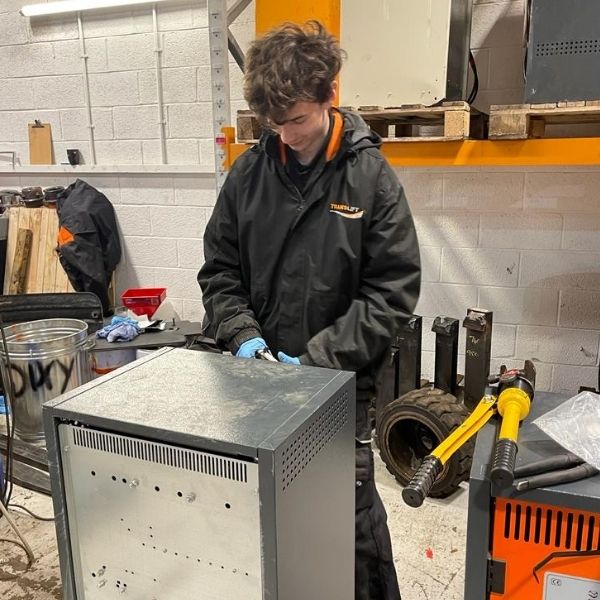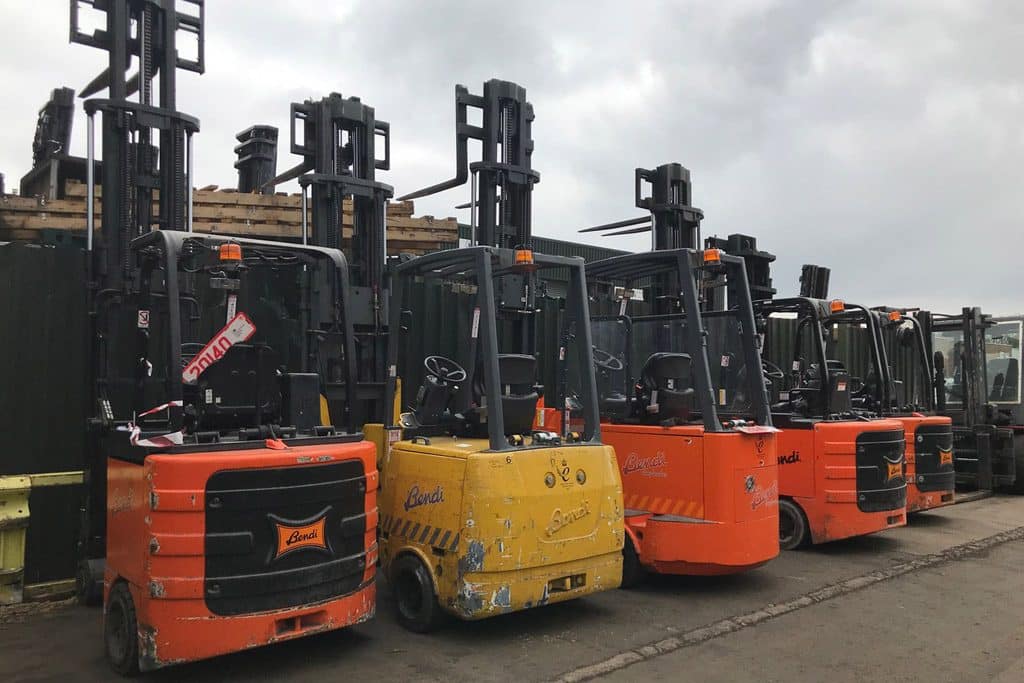You’re in the middle of a busy workday, and your trusty forklift decides to call it quits. Unexpected downtime not only puts a dent in your productivity but also incurs repair costs that hit your bottom line hard. This nightmare scenario can be averted by embracing the simple yet often overlooked practice of proactive forklift servicing.
“An ounce of prevention is worth a pound of cure.”
In the fast-paced world of warehousing and logistics, keeping your equipment in top shape isn’t just good practice; it’s essential. Regular maintenance and timely servicing can save you from unexpected breakdowns, expensive emergency repairs, and extended downtime. Let’s dive into why proactive forklift servicing is not just a cost, but an investment that pays off in the long run.
What are the common issues caused by neglected forklift maintenance?
Running a forklift without regular maintenance can be risky. The long-term implications can be far-reaching, impacting not just your safety but also your bottom line. From unexpected breakdowns to hefty fines, ignoring routine servicing is a gamble you can’t afford to take.
Imagine a scenario where a forklift suddenly fails in the middle of a busy workday. It’s not just an inconvenient setback but a productivity killer. Downed equipment can halt your operations, leading to delayed deliveries and dissatisfied customers. These disruptions can snowball into lost revenue, all because of overlooked maintenance.
Furthermore, neglected maintenance can result in unsafe work conditions. Forklifts are heavy machinery, and when they’re not in top shape, they become hazards. Faulty brakes, worn-out tyres, or malfunctioning hydraulics can lead to serious accidents, putting your employees at risk. Workplace injuries are not only tragic but can also be extremely costly with potential medical expenses, legal fees, and increased insurance premiums.
Another financial hit comes with compliance violations. OSHA standards mandate regular forklift inspections and maintenance. Failing to meet these standards can lead to substantial fines. By keeping up with routine servicing, you’re not only ensuring the safety of your workforce but also staying compliant and avoiding penalties.
Moreover, routine maintenance maximizes the service life of your forklifts. Regular checks and timely interventions catch minor issues before they evolve into major, more expensive repairs. This proactive approach helps in extending the lifespan of your equipment, ensuring you get the most out of your investment and maintaining a higher resale value when it’s time to upgrade.
What are the common issues caused by neglected forklift maintenance?
Forklift negligence isn’t just an inconvenience—it can be a recipe for disaster. Issues like cracked mirrors, dented exteriors, and damaged safety decals often go unnoticed in a neglected forklift. These seemingly minor problems can escalate into severe safety hazards or costly repairs.
For example, cracked mirrors can significantly reduce visibility, making it difficult for operators to navigate safely. Similarly, dents and protrusions can affect the forklift’s structural integrity, risking both the machine and the operator. Safety features, such as seatbelts and nameplates, must remain intact and visible to ensure compliance with safety regulations.
So, what’s the solution? Integrate a Daily Forklift Inspection Checklist into your routine. This checklist can help you catch minor issues before they become major problems, contributing to the overall safety and functionality of your equipment.
Remember: Regular upkeep isn’t just about maintaining machinery; it’s about maximizing your return on investment and ensuring a safe work environment. Taking a proactive approach saves money and minimizes safety hazards in the long run.
What are the key benefits of regular forklift servicing?
Regular forklift servicing significantly reduces the likelihood of unexpected breakdowns. By identifying and addressing potential issues early, you can prevent costly repairs and downtime, ensuring that your operations run smoothly and efficiently.
Proactive maintenance extends the lifespan of your forklifts. Regularly serviced machines are less likely to suffer from wear and tear, which means they can remain in service for longer periods, providing better returns on your investment.
Safety is a paramount concern in any workplace, and well-maintained forklifts are less likely to cause accidents. Regular servicing ensures that all safety features are functioning correctly, reducing the risk of injury to operators and other employees.
Efficiently running forklifts consume less fuel and operate more effectively. Regular servicing can optimize engine performance and other mechanical components, leading to lower fuel costs and improved overall efficiency.
Maintaining a consistent servicing schedule can enhance the resale value of your forklifts. Prospective buyers are more likely to pay a premium for well-maintained equipment, which can be a significant financial advantage when it comes time to upgrade your fleet.
Regular servicing helps maintain compliance with industry regulations and standards. Ensuring that your forklifts meet all legal requirements can prevent costly fines and legal issues, protecting your business from potential liabilities.
A well-maintained forklift fleet can improve overall productivity. Reliable equipment means fewer interruptions and delays, allowing your workforce to focus on their tasks without the frustration of dealing with malfunctioning machinery.
By being proactive about your forklift servicing, you’re not just ensuring the safety and efficiency of your operations—you’re making a smart financial decision. From boosting productivity and enhancing safety to maximizing the service life and resale value of your equipment, regular maintenance is an investment in your company’s success. So, don’t get forked up; keep your forklifts in top-notch condition and watch your business thrive!
How often should forklifts be serviced to maintain optimal performance?
Maintaining optimal performance for your forklifts hinges largely on sticking to a consistent servicing schedule. Industry best practices suggest that forklifts should receive preventive maintenance every 200 to 250 hours of operation, roughly translating to every six weeks for units in regular use. However, the exact frequency can depend on various factors such as the age, usage intensity, and service history of the forklift.
Older models or those with a history of frequent issues might require more frequent inspections and servicing. On the other hand, newer forklifts or those maintained meticulously could stretch the interval between services slightly longer—up to 300 hours. Regardless, a generalized thumb rule is essential: preventive maintenance at least every 250 to 300 hours of use is paramount to keep performance and safety at peak levels.
Additionally, the type of power your forklift uses—electric, diesel, or gas—also plays a role in determining maintenance frequency. Each power type has specific needs and potential points of wear and tear that necessitate unique attention. For instance, electric forklifts commonly need battery checks and maintenance, while diesel forklifts may require more frequent oil changes and inspections of the fuel system.
Daily inspections are equally crucial. Before any forklift is used on a job site, it should undergo a thorough daily inspection to catch and address minor issues before they escalate into significant problems. This daily regimen includes checking for tire conditions, leaks, battery charge levels, and fluid levels, and ensuring operational controls are functional.
By adhering to these maintenance schedules and daily practices, you’re safeguarding not only the lifespan of your equipment but also ensuring a safer work environment. Remember, proactive servicing is not just about compliance; it’s about maximizing productivity and avoiding the high costs associated with unexpected downtimes and repairs.
Final Words
In the fast-paced world of material handling, neglecting forklift maintenance is a mistake that can lead to costly repairs and dangerous working conditions. Proactive servicing is not just a good practice; it’s a necessity. By implementing regular checks and preventative measures, you can ensure the longevity of your forklift, the safety of your employees, and the overall efficiency of your operations. Remember, a well-maintained forklift is a reliable forklift. So, don’t wait until it’s too late—make proactive servicing a part of your routine today. You’ll save money, reduce downtime, and keep your team safe.






